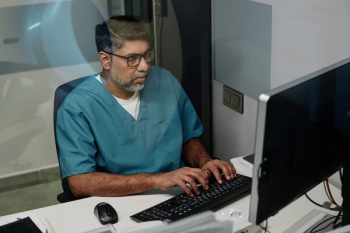
Speaking Plainly
Word choice matters when it comes to professionalism and expertise.
Once upon a time, during the ICU month of my internship, we were going about our morning rounds. The post-call guy, in his 25th hour of work, had had a rough night and was doing his punch-drunk best to report all relevant developments to the satisfaction of the prim attending who rode herd on us.
She caught him a little off-guard at one point, asking him about the next patient when he was still mentally focused on the previous one, and for a moment he was a deer in headlights. She prompted him again: How was the patient, Mr. X?
The intern fumbled with his papers, trying to find the ones relevant to Mr. X, and in the process responded not with the usual checklist of vital-signs, bloodwork, etc. Instead, his offering was: “He’s OK.” It probably wouldn’t have amused the rest of us anywhere near as much if the attending hadn’t been visibly discomfited by even this small informality.
Most of us medical types avoid such colloquialisms in our professional roles. Some, maybe, make a conscious effort at it…but, I think it becomes a reflex after being under scrutiny as budding professionals during years of education and postgrad training. It exists even as we become junior attendings, trying to live up to expectations from our superiors.
It, thus, stands out, if not comically, then, at least as odd, when we see someone breaking ranks and talking like, well, a normal person, rather than in the technical/formalized (some might stay stodgy or stilted) style we expect. At least once or twice a year, I’ll see a prior-study report in which a rad says something like “The liver is okay,” and it will momentarily derail my train of thought.
For the most part, such breaches are not intrinsically wrong (assuming, of course, that the underlying interpretation is correct). I might say the liver is unremarkable, someone else might say it is normal. If nobody is liable to believe that an “okay” liver might somehow be abnormal, where’s the harm?
A physician like Dr. Tevye (what, he had to stay a milkman forever?) might protest by bellowing that this flies in the face of tradition. And, in truth, a lot of us behave as we do because it’s the way we always have…probably because our mentors led us to believe it was the way they always had, and their mentors before them.
Digging a little deeper, there is a certain pragmatic value to maintaining formalized speech patterns. If you talk (or dictate) like a professional, others are that much likelier to regard you as one…docs, as well as patients. Talk like someone who didn’t go through med school, and however many years of subsequent training you have, you might raise the question as to whether you actually did. Or, maybe, they will wonder if you failed to learn what you were supposed to…even forgot or became careless with it.
If your lingo seems unprofessional, let alone downright sloppy, is your audience going to have as much faith that you’re taking due care with other aspects of your work? When someone reads about your “okay” liver, are they going to have as much faith that you seriously scrutinized it for subtle abnormalities-or that you would correctly characterize them if any were there?
When I see a prior report referring to an “okay” liver or otherwise waxing colloquial, I lose some faith in the quality of the interpretation. I know that’s leaping to conclusions, and I try to fight against the impulse, but after 25 years in the medical field in which 99 percent of capable personnel speak and write, well, properly, someone who can’t or won’t toe the line sticks out -- and not in a favorable way.
I probably mentioned in one or more previous columns that I hate wearing ties, as well as even the expectation of them. But, I have to admit that there is a parallel here. A lot of folks attribute importance to looking professional so you’ll be taken seriously. The trappings of professionalism also serve as a quiet but constant reminder to a doc: You’re in your formal garb-behave and perform accordingly.
Can sounding like a professional be any less important than looking like one?
Newsletter
Stay at the forefront of radiology with the Diagnostic Imaging newsletter, delivering the latest news, clinical insights, and imaging advancements for today’s radiologists.












